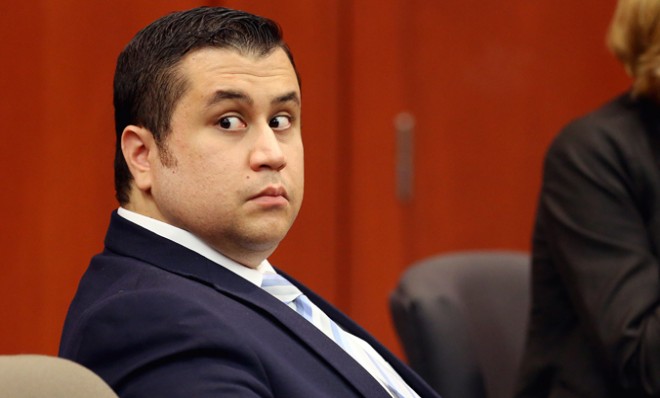What happens if George Zimmerman walks free?
Tension builds as the trial over the shooting death of 17-year-old Trayvon Martin winds down

A free daily email with the biggest news stories of the day – and the best features from TheWeek.com
You are now subscribed
Your newsletter sign-up was successful
As the George Zimmerman trial winds down, Florida officials are preparing for the scenario that he is found not guilty of second-degree murder for shooting 17-year-old Trayvon Martin in February of 2012. In a video released yesterday by the Broward County Sheriff's Department, a Hispanic woman and a black man urge Martin's supporters to "raise your voice and not your hands," and assures them that "law enforcement has your back."
It's a stark reminder of the racial subtext of a trial in which the explicit mention of race has been largely avoided. The judge has forbidden the term "racial profiling." The most debated question hasn't been whether or not George Zimmerman got out of his car and followed Martin because of his race; it has been who was crying for help in a 911 call.
Outside the courtroom, however, the question of race looms large. The jury, which might begin deliberations before the weekend, could decide the case in a number of ways. The jurors could find George Zimmerman guilty of second-degree murder, which could land him in prison for 25 years to life.
The Week
Escape your echo chamber. Get the facts behind the news, plus analysis from multiple perspectives.

Sign up for The Week's Free Newsletters
From our morning news briefing to a weekly Good News Newsletter, get the best of The Week delivered directly to your inbox.
From our morning news briefing to a weekly Good News Newsletter, get the best of The Week delivered directly to your inbox.
If jurors aren't convinced that Zimmerman acted with "a depraved mind without regard for human life" — the threshold for second-degree murder — he could still be convicted of a lesser charge such as manslaughter and face up to 30 years in jail.
Or he could walk free.
It's the prospect of Zimmerman — who admittedly shot an unarmed black teen carrying iced tea and a bag of Skittles — avoiding any jail time that has people upset.
(MORE: The George Zimmerman trial: A day-by-day recap)
A free daily email with the biggest news stories of the day – and the best features from TheWeek.com
"They're going to be angry. They're going to be disappointed. They wouldn't be surprised," the Rev. Harrold C. Daniels tells The Washington Post of the African-American community in Broward County, Florida. "They feel, 'Oh, he's going to get off.' They'll take it as another slap against civil rights."
The memory of Emmett Till, a 14-year-old boy murdered in 1955 for reportedly flirting with white women, already has been invoked. Not that the courtroom is the best place to resolve direct and institutional racism, says NPR's Gene Demby.
"Criminal cases — and the Zimmerman trial, in particular — are lousy proxies for fights over big, messy social issues," writes Demby. "The verdict will hinge less on any lofty sense of justice than it might on what instructions the judge gives to the jury."
Still, it will be impossible to pretend that people won't find wider implications in an acquittal.
"Imagine George Zimmerman being followed at night, in the rain, by an armed, unknown black man," writes The New Yorker's Jelani Cobb, adding:
Add a twist in which that black man fires a shot that ends a person's life, and it's hard to imagine him going home after a brief police interview, as Zimmerman did.
[Prosecutor Bernie De la Rionda's] team is charged with prosecuting a crime, not a set of social attitudes that facilitate it. But whatever its legal merits, the prosecution's approach has left intact the suspicion that Florida's proactive self-defense laws are color-coded, intended for people in fearsome encounters with blacks, not blacks in fearsome encounters. [The New Yorker]
Back when news of Trayvon's death first broke across the country, protests in New York City sprung up in solidarity with the Martin family, with many citing the NYCLU's statistic that black and Hispanic residents made up 90 percent of stop-and-frisk subjects between 2002 and 2011.
If Zimmerman is acquitted, it's not unlikely that protests around the country will erupt once more — over racial profiling, Florida's "Stand Your Ground" law, and a host of other frustrations.
"Nothing good will come of this case," laments Esquire's Charles P. Pierce. "Nothing."
Hip-hop mogul Russell Simmons, however, hopes that the trial, whatever the verdict, will be something to rally around.
"It is the future that needs to be protected and everyone who stood up for Trayvon plays a part in that protection," he writes in The Huffington Post. "If we failed to protect Trayvon on Feb. 26, 2012, we will pledge to never make that mistake again."
Keith Wagstaff is a staff writer at TheWeek.com covering politics and current events. He has previously written for such publications as TIME, Details, VICE, and the Village Voice.
-
 Samurai: a ‘blockbuster’ display of Japanese heritage
Samurai: a ‘blockbuster’ display of Japanese heritageThe Week Recommends British Museum show offers a ‘scintillating journey’ through ‘a world of gore, power and artistic beauty’
-
 BMW iX3: a ‘revolution’ for the German car brand
BMW iX3: a ‘revolution’ for the German car brandThe Week Recommends The electric SUV promises a ‘great balance between ride comfort and driving fun’
-
 Munich Security Conference: a showdown between Europe and Trump?
Munich Security Conference: a showdown between Europe and Trump?Today’s Big Question Report suggests European leaders believe they can no longer rely on the US for military support – but decoupling is easier said than done